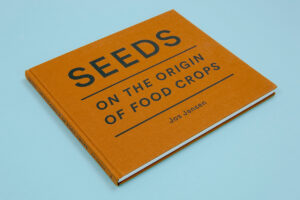YOUR CART
- No products in the cart.
Subtotal:
€ 0

Concept, photography and texts:
Jos Jansen
Edit:
Rob van Hoesel
Jos Jansen
Essays:
Bas Haring
Jos Jansen
Translation:
Baxter Communications
Design:
Rob van Hoesel
Lithography:
Sebastiaan Hanekroot (Colour & Books)
Production:
Mart Spruijt
Supported by:
Stichting Provinciale Atlas Noord-Holland
Stichting Seed Valley
Gemeente Schagen
AgriBusiness Legal Desk
Agri Information Partners
Documentary photographer Jos Jansen (NL) examines how new food crops are developed and how this process bears upon the world food problem. Seeds is about Darwin’s natural selection and how it has long been overtaken by high-tech plant breeding which in essence accelerates evolution.
In order to be able to select a plant that is resistant to insect plagues in Africa or droughts in China, literally thousands of plants first have to be made sick, until eventually that one healthy plant remains with just that tiny bit of DNA that allows it to be the sole plant to survive – the chosen one.
The book focuses on the aspect of how new food crops that are resistant to pests and diseases are bred, and therefore contribute significantly to our future food supply. Over many years and in numerous repetitive cycles – crops are crossed, bred, tested and selected again and again, so as to achieve that specific goal.
Behind the images in this project, quintessential questions arise. Who is actually in charge on this planet? Nature? Human beings? A god? Should humans stop interfering with evolution and go back to the authenticity of small-scale farms and city farming? Or rather, is it humanity’s duty to steer evolution so that we can create enough food to feed the booming world population?
Where do you draw the line between acceptable and unacceptable? Between natural and unnatural? And what does ‘natural’ mean anyway? In the book philosopher Bas Haring embraces this by posing: “Why would natural things – plants and animals – be better for us than unnatural or “less natural” things?”
Jos Jansen is a Dutch visual artist whose work spans image-making, writing, research and psychology. His chief concerns include learning to see where people’s boundaries lie, especially in relation to technology, science and nature. His work was published and exhibited in the Netherlands, Spain, France, Belgium, United Kingdom, Russia, Japan, the United States and South Korea. Some Way Out of Here is Jansen’s sixth book published by The Eriskay Connection.